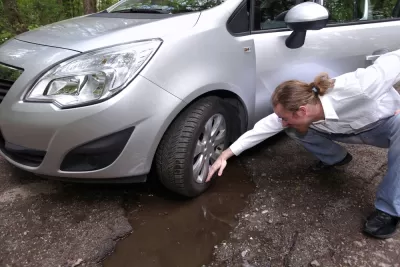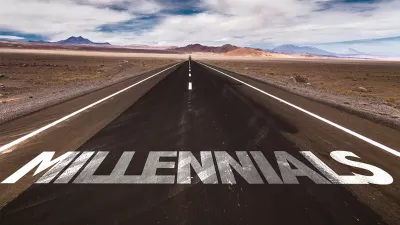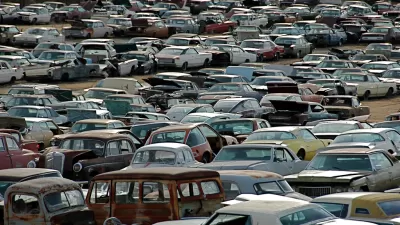If you thought inflation and fuel efficiency, along with politicians unwillingness to raise gas taxes were the main causes of America's decaying road and bridges, S&P adds another contributing factor—millennial transportation preferences.

Millennials are not directly responsible for that pothole you may have just driven through - but their "driving and vehicle purchasing habits—or lack thereof—greatly contribute to the decreased collection of the federal gas tax," writes Kathleen Burke for MarketWatch. And the Highway Trust Fund, where those gas taxes are deposited, is what funds much of the road repair on the interstate highway system.
The millennial blame can be found in S&P's Oct. 19 economic research report, "Millennials Are Creating Unsafe Conditions On U.S. Roads--But Not In The Way You Might Think (pdf)," written by Beth Ann Bovino and Geoffrey E Buswick,
Burke analyzes rates of licenses issued, VMT, public transit usage, and millennial preference for green cars. She omits biking and carshare though—both greatly associated with millennial travel preferences.
But it's not just preferences that are responsible for millennials not propping-up the Highway Trust Fund as other generations have done, observes the Financial Times on the new report.
A major one is the economy: Wages among younger workers have been depressed, while unemployment and underemployment remain high. On top of that, the generation which was born from 1982-2000, also tends to start families later in life, perhaps halting moves into the suburbs where driving is more common.
S&P's report contradicts, to some extent, Yonah Freemark's post that we can't expect millennials to save us from our auto-dependent ways. We may still be a nation of drivers, regardless of millennial travel preferences, but their transportation biases are impacting our ability to pay for road upkeep.
Hat tip to Jennifer Scholtes, transportation reporter for POLITICO Pro.
FULL STORY: Too many potholes? Blame millennials

Planetizen Federal Action Tracker
A weekly monitor of how Trump’s orders and actions are impacting planners and planning in America.

Maui's Vacation Rental Debate Turns Ugly
Verbal attacks, misinformation campaigns and fistfights plague a high-stakes debate to convert thousands of vacation rentals into long-term housing.

Restaurant Patios Were a Pandemic Win — Why Were They so Hard to Keep?
Social distancing requirements and changes in travel patterns prompted cities to pilot new uses for street and sidewalk space. Then it got complicated.

In California Battle of Housing vs. Environment, Housing Just Won
A new state law significantly limits the power of CEQA, an environmental review law that served as a powerful tool for blocking new development.

Boulder Eliminates Parking Minimums Citywide
Officials estimate the cost of building a single underground parking space at up to $100,000.

Orange County, Florida Adopts Largest US “Sprawl Repair” Code
The ‘Orange Code’ seeks to rectify decades of sprawl-inducing, car-oriented development.
Urban Design for Planners 1: Software Tools
This six-course series explores essential urban design concepts using open source software and equips planners with the tools they need to participate fully in the urban design process.
Planning for Universal Design
Learn the tools for implementing Universal Design in planning regulations.
Heyer Gruel & Associates PA
JM Goldson LLC
Custer County Colorado
City of Camden Redevelopment Agency
City of Astoria
Transportation Research & Education Center (TREC) at Portland State University
Jefferson Parish Government
Camden Redevelopment Agency
City of Claremont





























